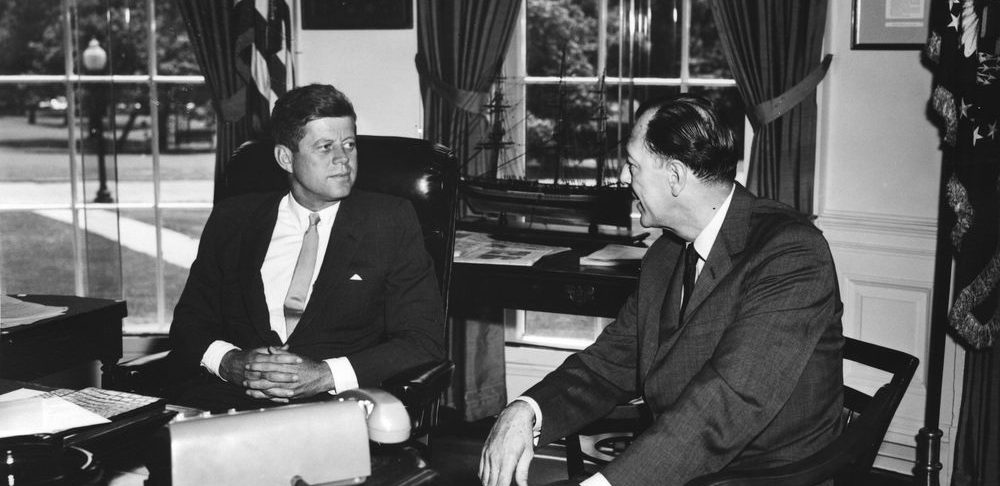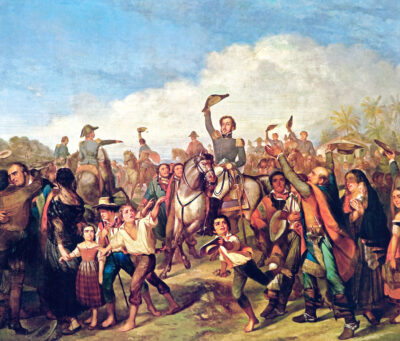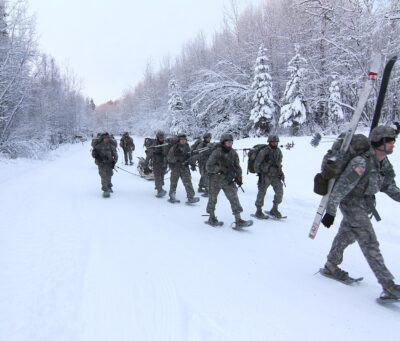Review of JFK: Volume 1: 1917-1956 by Fredrik Logevall (Random House, 2020).
In February 1951, a thirty-three-year-old Congressman named Jack Kennedy appeared before the U.S. Senate’s Committee on Foreign Relations. Handsome, articulate, and reputed as an emerging authority on American foreign policy, he had just returned from a five-week tour of Europe, and by the Committee’s invitation he was now testifying about what he had learned from his travels. In particular, the Committee wished to know his opinion on whether the United States should contribute to European defense against a possible Soviet invasion.
The United States, Representative Kennedy told the Committee, ought to take a leading role in Europe — not to shoulder the burden of European defense by itself, he clarified, but to demonstrate to the world its commitment to peace and democracy on the continent and to help allies develop their own military capabilities.[1] Simultaneously assertive and cautious, idealistic and pragmatic, it was a view of foreign policy that Kennedy had developed over years of studying and participating in international affairs — and one that arguably shares much in common with the Hamiltonian view.
When we remember Kennedy today, we tend to think of his influence on domestic life: the inspiring rhetoric, the New Frontier, the Moon project, the tragic assassination. In contrast, the backdrop for much of JFK: Coming of Age in the American Century, Harvard professor Fredrik Logevall’s excellent new biography, is the international scene. Kennedy, we learn, was a serious and principled foreign policy thinker, someone who, from an early age, was fascinated by international history and who, in his later years, wrestled with the question of what role America should play in the world.
Indeed, in Logevall’s framing, Kennedy’s trajectory and American foreign policy were intertwined: “Kennedy’s life story,” Logevall writes, “tracks with major facets of America’s political and geopolitical story.”[2] He was born in 1917, one month after the U.S. entered the Great War; he was cut down in 1963, at arguably the zenith of the Pax Americana. Most Kennedy biographies study his life for its own sake, but in Coming of Age in the American Century (the first of two planned volumes), the story of Kennedy’s rise to power in American politics becomes something greater, a microcosm of America’s rise to supremacy in geopolitics.
The task was particularly suited for Logevall, a Swedish-American historian of U.S. foreign relations whose prior work has focused on the Vietnam War and the “intermestic” (international-domestic) dimension of foreign policy, whereby domestic politics and international affairs dynamically interact.[3] Indeed, the book’s greatest and most unique strength is its contextualization of the plot of Kennedy’s life and the development of his worldview within the broader play of international statecraft. The result is a masterful blend of biography and history, the life and the times, meticulously researched and compellingly written.
LEARNING IN TIME
Besides deepening our understanding of Kennedy’s life and American diplomatic history, Coming of Age offers to the Hamiltonian community two important lessons about U.S. foreign policy. The first concerns the study of history and international affairs; the second the extent to which America should exercise power and influence overseas.
First, Kennedy’s life offers proof that beginning one’s foreign policy education early yields benefits later. Resisting the popular image of young Jack as a careless, swashbuckling adolescent, Logevall portrays Jack as a thoughtful young man genuinely interested in understanding the rapidly changing world around him. From an early age, as Logevall tells it, Jack had a serious international sensibility and was deeply curious about global political systems and cultures. Already in his teenage years, he was reading voraciously, devouring books on European statecraft (like Churchill’s The World Crisis) and lecturing his siblings about the rise and fall of the great powers of history. Later, in his college years, he toured Europe and penned memos to his father about the politics of the places he visited. In his senior year at Harvard, he wrote an honors thesis on the English policy of appeasement, which subsequently became a bestselling book under the title Why England Slept (1940).[4]
Jack’s early study of foreign policy allowed him to grapple, at an advanced stage, with the difficult questions he would later confront as president. Should politicians defer to the public’s judgment (i.e. prioritize their own political interest), or should they follow their own judgment, even when it opposes that of the voters? Do democracies’ openness and accountability to popular opinion promote or preclude effective statecraft? Are democracies disadvantaged in foreign policy compared to other forms of government?[5] Encountering these dilemmas earlier rather than later gave Kennedy time to formulate and refine the principles of decision-making he would later call upon as a policymaker.
Further, Jack’s proficiency in foreign affairs helped propel his political career. During his years as a Representative and Senator, his considered, nuanced analyses of foreign policy issues distinguished him from other more domestically-concerned politicians and helped him build a national profile. [6] As president, he certainly had his share of foreign policy fiascos (notably, his approval of the Bay of Pigs invasion in 1961 and his expansion of American involvement in Vietnam throughout his presidency, two decisions Logevall will likely scrutinize in the second volume), but his handling of the October 1962 Cuban Missile Crisis demonstrated his extraordinary abilities to reason historically, understand the enemy, and remain composed under pressure.[7] Kennedy’s skill in these respects was surely honed by his years marinating in the lessons of international history.
To be sure, much of Jack’s foreign policy education came through opportunities reserved for the ultra-elite world to which he belonged. In the summer of 1939, right after his junior year at Harvard and just months before the outbreak of World War II, he landed an internship any Hamiltonian would accept in a heartbeat: personal aide to the U.S. Ambassador to England, his own father Joseph P. Kennedy. In that capacity, he worked at the embassy, met high-level officials, and shadowed his father at events (including tea with King George VI and Princess Elizabeth). He even received an early lesson in crisis management when he was dispatched, by his father, to Scotland to greet and address the concerns of three hundred rescued American passengers of a British liner that a German submarine had torpedoed.[8] Jack received “the kind of exposure and training,” Logevall writes, “that no future president since John Quincy Adams had enjoyed at so young an age.” The effect of this training upon Jack? “[A]n intensified passion for foreign policy and world affairs that he never abandoned.”[9]
Most importantly, Kennedy understood the fundamental, if subtle, importance of foreign policy to the American way of life. “[A]ny Congressman, any Senator today, to be worthy of his salt,” then-Representative Kennedy told a nationwide radio audience in 1951,
…must lift his vision from the immediate problems of his constituency to reach for an understanding of the role that America should play in this world. Foreign policy today, irrespective of what we might wish, in its impact on our daily lives, overshadows everything else. Expenditures, taxation, domestic prosperity, the extent of social services — all hinge on the basic issue of peace or war.
For Kennedy, foreign policy was not merely another line item on the list of issues; it was the bedrock issue, the foundation of American liberty and prosperity, the sine qua non without which the American way of life would crumble. As a result, he worried about what he saw as the neglect of foreign affairs by policymakers and the public alike, and in his public statements he urged Americans to think more seriously about their relations to other peoples and places. “[I]t is a democratic America and not a bureaucratic government that must shape America’s destiny,” he continued, and therefore “[f]oreign policy is too important to all of us to leave it to the experts and the diplomats.”[10] Kennedy was calling for the revitalization of foreign policy education, discourse, and debate in America. Seventy years later his words still resonate.
JFK, HAMILTONIAN?
Second, Kennedy’s views on the foreign policy issues of his day are instructive, as much about the need for U.S. global leadership as about hegemony’s limitations. Whenever we read history, we must be careful not to impose our own beliefs onto the past; that caveat stated, Logevall’s biography provides substantial evidence that Kennedy tended toward what we call today a Hamiltonian view of foreign policy.
Kennedy saw America as not just a nation but also an idea, a grand experiment, unique in the history of nations for its commitment to liberty, equality, and democracy, and therefore morally worth preserving. But the way to preserve it was not, as others (including his father) believed, to isolate it from world affairs; rather, Americans had to shape and lead world affairs. (Henry Luce articulated this line of thought most forcefully in his classic 1941 article on the “American Century,” which argued that the U.S. needed to accept its place as “the most powerful and vital nation in the world” and “exert upon the world the full impact of our influence” so as to bend the “world-environment” toward its own interests.)[11] In practical terms, this meant that the U.S. should engage in diplomacy with other nations to prevent rearmament, commit itself to preserve the balance of power in Europe, and lead a Western alliance to prevent the expansion of the Soviet Union and the spread of communism.[12] For Kennedy, the stakes of the debate were enormous: if Americans refused to take part in foreign affairs, he insisted, their internal freedoms would be threatened. Thus was Kennedy, in Logevall’s words, “committed to the proposition that the United States must play an ongoing leadership role in world affairs.”[13]
Yet Jack was no starry-eyed idealist, nor was he a knee-jerk interventionist. The dangers of overextension troubled him, as did the gravity of sending American men abroad to fight and possibly to die. Above all, though he was willing to use power to American ends, he accepted its limitations. When some in Washington were advocating for the U.S. to assist the French in re-colonizing Vietnam — according to the widely-accepted “domino theory,” if one Southeast Asian nation fell to communism, the rest would fall “like a row of dominoes” — Kennedy remained opposed to American intervention in the region.[14] His doubts were partly strategic in nature. Rather than imperialistically imposing its will on other parts of the world, he argued, the U.S. should build up soft power by respecting the decisions and aspirations of emerging nations, gaining credibility and building long-term trust in the process.[15]
But there was also a more human concern, a sensitivity to the suffering war imposes on those who fight them. To send American men off to a faraway nation in which the U.S. had no direct national security interest — to face an enemy which had the “sympathy and covert support of the people” of that nation, which meant in practice that the U.S. would not have even a “remote prospect of victory” — would be “dangerously futile and destructive,” Kennedy declared in a 1954 Senate speech.[16] His aversion to sending men overseas likely grew out of his own intimate experiences with the tragedies of war. During World War II, the patrol torpedo boat he commanded was sunk by a Japanese destroyer, leaving him and his crew stranded on islands in the Blackett Strait for six days. Some of his crew members perished during the crisis; his older brother Joseph, a Navy pilot, died on a top-secret mission less than a year later.[17] As a result of these experiences, Kennedy’s hawkish tendencies were tempered by an awareness of the high human costs of any foreign intervention and a skepticism about how much such interventions can achieve.
In Logevall’s assessment, Kennedy’s foreign policy worldview was one of “pluralist, liberal internationalism — idealistic yet infused with pragmatic realism.”[18] Could this not also be said of the Hamiltonian philosophy? Like Kennedy did, Hamiltonians believe that America’s commitment to liberty, equality, and the rule of law is exceptional; that these ideals are morally worth preserving at home and spreading abroad; and that American global leadership is necessary to this enterprise. Simultaneously, like Kennedy did, Hamiltonians balance this idealism with pragmatism and recognize that power must be exercised prudently, not frivolously, with care for the national interest, in furtherance of the nation’s credibility, and in light of power’s limits.[19] Like Kennedy did, Hamilton himself balanced idealism with pragmatism in his classic Pacificus essays, wherein he asserted that the ideal foreign policy is one “regulated by [a nation’s] own interest, as far as justice and good faith permit.”[20] That two men with such starkly different backgrounds and from such different times — 18th-century “bastard, orphan” versus 20th-century Boston blueblood — came to similar conclusions about American foreign policy is a testament to the enduring relevance of Hamilton’s ideas and perhaps even to the strength of the Hamiltonian view.[21]
Logevall took on a mighty charge by writing yet another book about one of America’s most beloved presidents, but he has more than succeeded by producing an intelligent, thought-provoking, and cosmopolitan volume on Kennedy’s early life. While we wait with anticipation for the second volume on Kennedy’s final years, we ought to study Coming of Age for the lessons it offers aspiring policymakers, and perhaps take comfort that this ablest of presidents seems to have been closely aligned with the principles of the Alexander Hamilton Society.
Samarth Desai is a 2020 graduate of Harvard College, where he co-founded an Alexander Hamilton Society chapter. He is the Special Assistant to the President & CEO of the National Constitution Center.
—
Notes:
[1] Remarks of Representative John F. Kennedy before the Senate Committee on Foreign Relations (1951) (statement of John F. Kennedy). Accessed January 9, 2021. https://www.jfklibrary.org/archives/other-resources/john-f-kennedy-speeches/united-states-senate-committee-on-foreign-relations-19510222. See also Fredrik Logevall, Coming of Age in the American Century, 1917–1956, vol. 1, JFK (New York: Random House, 2020), 485–86.
[2] Logevall, Coming of Age, xv.
[3] Fredrik Logevall, “Politics and Foreign Relations,” The Journal of American History 95, no. 4 (March 2009): 1077, https://www.jstor.org/stable/27694561. See also Campbell Craig and Fredrik Logevall, America’s Cold War: The Politics of Insecurity (Cambridge, MA: Harvard University Press, 2009), 9–10.
[4] Logevall, Coming of Age, xvi, 97, 183, 211, 228–64.
[5] Logevall, Coming of Age, 182, 253.
[6] Logevall, Coming of Age, 496–97, 645–46.
[7] See Richard E. Neustadt and Ernest R. May, Thinking in Time: The Uses of History for Decision Makers (New York: Free Press, 1986), 1–16.
[8] Logevall, Coming of Age, 206, 225–226.
[9] Logevall, Coming of Age, 227.
[10] John F. Kennedy, Radio report on trip to Middle and Far East, November 14, 1951, accessed December 29, 2020, https://www.jfklibrary.org/asset-viewer/archives/JFKPOF/135/JFKPOF-135-002. See also Logevall, Coming of Age, 496–97.
[11] Henry R. Luce, “The American Century,” Diplomatic History 23, no. 2 (Spring 1999): 165–66, https://www.jstor.org/stable/24913736.
[12] Logevall, Coming of Age, 383, 449, 554.
[13] Logevall, Coming of Age, xvi.
[14] Dwight D. Eisenhower, “The President’s News Conference of April 7, 1954,” in Public Papers of the Presidents of the United States (Washington, DC: Office of the Federal Register, 1960), 383, http://name.umdl.umich.edu/4728402.1954.001.
[15] Logevall, Coming of Age, 496–97, 554.
[16] Logevall, Coming of Age, 576.
[17] Logevall, Coming of Age, 333, 340–46, 375–77.
[18] Logevall, Coming of Age, 436.
[19] See “What We Believe,” The Alexander Hamilton Society, accessed January 10, 2021, http://www.alexanderhamiltonsociety.org/what-we-believe.
[20] Alexander Hamilton, “Pacificus Number III,” 1793, in The Pacificus–Helvidius Debates of 1793–1794: Toward the Completion of the American Founding, ed. Morton J. Frisch (Indianapolis: Liberty Fund, 2007), 33. See also Carson Holloway, Alexander Hamilton and American Foreign Policy, report no. 57, First Principles (Heritage Foundation, 2015), accessed December 29, 2020, https://www.heritage.org/political-process/report/alexander-hamilton-and-american-foreign-policy.
[21] Hamilton: An American Musical, written by Lin Manuel-Miranda. On Hamilton’s birth and childhood, see Ron Chernow, Alexander Hamilton (New York: Penguin, 2004), 7–28.
Image: “JCharles Edward Rhett With JFK” by Abbie Rowe, retrieved from https://commons.wikimedia.org/wiki/
File:Charles_Edward_Rhett_With_JFK.jpg, image is in the public domain.



